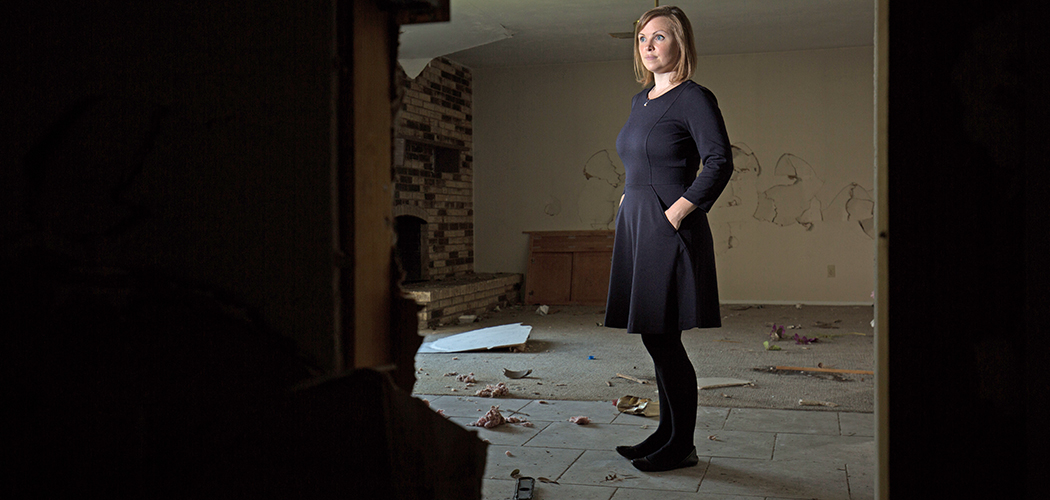Community prosecutor Amanda Chase is cleaning up our neighborhood’s eyesores and drug houses

Amanda Chase (Photo by Rasy Ran)
Belle Nora on Garland used to be the gem of White Rock Lake, but lately the historic mansion has become an eyesore. More than that, really. In some respects it’s just unsafe. There is structural damage, rotting wood around the property, unprotected exterior surfaces and holes, cracks and loose material in the walls.
The danger around Belle Nora is what brought Community Prosecutor Amanda Chase to its front door. Chase says the code issues surrounding the house are significant, but that her office is working with Belle Nora owner David Anderson on bringing the property into compliance with city codes. The gate that had remained broken after a vehicle crashed into it, for example, was fixed in July, and more steps are planned to repair the house’s crumbling infrastructure.
“We set out all of the health and safety hazards and prioritized those hazards together,” Chase says. “But we’re not as rigid as the city appears to be sometimes and we can really work with someone, especially when they show a good faith effort.”
As the community prosecutor for northeast Dallas, Chase has worked with a variety of problem properties, from the biggest and brightest, like Belle Nora, to the rundown houses that stick out like sore thumbs in well kept family neighborhoods.
Her office is responsible for bringing different sects of city government together to work on blighted lots. She works with code and police officers and fire and health inspectors to coordinate improvements. The job is focused on finding solutions, and it requires frequent out-of-the-box thinking, she says.
A few years ago, Chase was working on a property near the Harry Stone Recreation Center. The center holds a special place in her heart because they host a job fair each year that her office helps organize. The job fair features employers that have what Chase calls “friendly background checks,” meaning they will overlook some employees’ checkered pasts.
“I really care about the neighborhood,” Chase says.
So when a prominently placed property near the rec center showed up on her radar, Chase took it personally.
The property was occupied by known drug users. It looked and smelled like a drug house, Chase says.
“There was a school nearby and kids walked by from school passing that house. [Dallas Police] had done things there to try to remove the criminal element, and code had done things there to try to address code issues, but they had never worked strategically before.”
That’s when Chase got involved. She convinced the owner to agree to a repair agreement and they developed a rapport.
Conditions inside the house can only be described as horrible. There was no running water and if there was any electricity, it was being stolen from another user. Her work can prove dangerous; several times she had to enter the home during compliance checks.
“There was a young man that was so out of his mind that he didn’t even know we were there. He was shooting up between his toes. People were passed out on the floors and couches and pallets of debris,” she says.
Later the owner was arrested and sent to jail on a non-related drug charge. Chase made the effort to visit him in jail to continue their work. That touched the homeowner.
“That made a really big impact on him. He said, ‘I can see you guys actually care.’ At this point he was clean, so he could see a little more clearly. He started making plans with a neighbor down the street to sell the house.”
This is essentially how Chase sees her job. She injects some humanity and a different perspective into a process that can often feel devoid of either.
The Dallas Police could have gone in and arrested the homeowners and the people staying there, but that would not have fixed the root of the problem, Chase says.
“They can only arrest so many people, and there’s always going to be people sleeping in a flop house,” she explains.
When it comes to Belle Nora, Chase is still thinking outside the box, even though the problems there are vastly different than those of a flop house.
Chase says the job gives her hope. It’s not every neighborhood that cares enough to call about another person’s house, she says. And clearly, our neighborhood cares. She says she’s been getting calls about Belle Nora since her second day on the job.
“I think a lot of people in this community are really proud to live here and they have a real devotion to their neighborhood,” she says. “That’s one of the reasons I love to work here. There’s so much personal investment in their neighborhoods. We have no lack of love from our communities here.”





